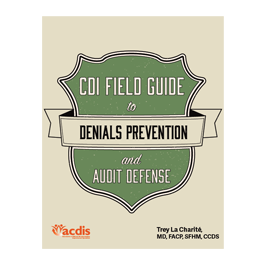Book excerpt: MACs, MICs, and the OIG—oh my!

Prevention and Audit Defense
By Trey La Charité, MD, FACP, SFHM, CCDS
Over the years, Congress passed numerous pieces of legislation to limit healthcare spending, combat losses due to fraud, and ensure that dollars spent truly benefit the American population with quality care. Numerous watchdog programs proliferated to promote billing compliance and quality of care. Such programs include the following:
- MAC (Medicare Administrative Contractors)
- MIC (Medicaid Integrity Contractors)
- OIG (Office of Inspector General)
- QIO (Quality Improvement Organizations)
- RA (Recovery Auditors)
- UPIC (Unified Program Integrity Contractors)
- ZPIC (Zone Program Integrity Contractors)
For today, let’s just look at the first three entities on that list.
MACs
MACs are private companies contracted by CMS to act as a central processing point for Medicare Part A and B claims. MACs are an attempt to align individual physician and hospital billing, thus auditing records from physician offices, hospitals, skilled nursing facilities, home health and hospice agencies, pharmacies, durable medical equipment (DME) providers, etc. CMS created MACs to identify Medicare billing patterns and increase the accuracy of the billing data received by CMS. For most hospitals, the primary MAC function appeared to be performing acute care status reviews and medical necessity reviews, in addition to establishing provider compliance with local coverage determinations and national coverage determinations. While initially performing prepayment status reviews for short-stay hospitalizations as well, CMS recently transitioned this function to another government entity.
MICs
MICs combine all the federal RAs, MAC, and ZPIC functions into one state-level organization for the purposes of overseeing state Medicaid programs. Similar to their federal counterparts, a MIC detects and corrects improper billing claims and payments from all types of providers that serve a state’s Medicaid beneficiaries and educates those same providers to prevent potential future billing errors. Some MICs have been characterized as intentionally opportunistic, presumably due to state budget deficit motivators.
OIG
The Department of Justice (DOJ) created the OIG in 1976. Public Law 95-452 authorizes the OIG to protect the integrity of CMS programs, as well as the health and welfare of the beneficiaries of those programs. The OIG routinely audits facilities and providers according to priorities outlined in its annual Work Plan.
Where other agencies recover only overpayments, the OIG has the authority to rescind an entity’s or individual’s privilege to receive reimbursement for services rendered to those participating in Medicare or Medicaid. Among its mandates comes the directive to identify ways in which to improve both the efficiency and the cost-effectiveness of the Medicare program. Additionally, the OIG is tasked with holding providers accountable who do not meet Medicare program participation requirements.
In other words, the OIG detects, corrects, and prevents improper Medicare payments as well as prosecutes those who violate Medicare rules and regulations under the law, according to the agency’s website.
A good example of the OIG at work can be seen in the OIG’s investigations of pneumonia coding in the late 1990s. In many cases, the OIG depicted the physician query process as an effort to “upcode” a patient’s diagnosis improperly. In its review of more than 100 hospitals, the agency found that most cases should have been assigned a lower-paying DRG based on physician documentation. Following the investigation, 34 hospitals entered into corporate integrity agreements and paid more than $35 million to settle respective False Claims Act (FCA) liability.
Healthcare administrators should be very concerned if the OIG suddenly arrives at the front door of their hospital. On the state level, the attorney general for each state handles any investigations or prosecutions related to improper or fraudulent Medicaid billing patterns.
Editor’s note: This article is an excerpt from the CDI Field Guide to Denial Prevention and Audit Defense.
